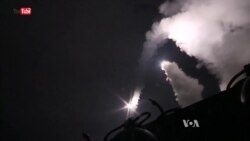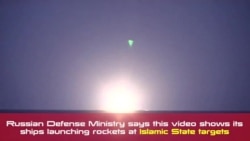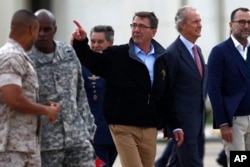Neither Russia nor Iraq warned the United States that cruise missiles had entered Iraqi airspace en route to Syria, a U.S. official told VOA.
Russia said Wednesday that it used four warships in the Caspian Sea to launch rockets at Islamic State targets in Syria. Rockets fired from those ships would have traveled through Iraqi airspace, where U.S. and coalition pilots are conducting anti-Islamic State operations to help Iraqi and Peshmerga forces defeat the extremists.
The official acknowledged to VOA that this is exactly the kind of action that could result in a mishap or misunderstanding. The official did not appear alarmed, however, by the move.
"It’s a big airspace,” the official said.
Russian Defense Minister Sergei Shoigu told President Vladimir Putin that Russia’s warships fired 26 cruise missiles at 11 IS targets, which he said were destroyed without causing any civilian casualties.
WATCH: Russian Defense Ministry video alleging launch of cruise missiles against IS targets in Syria
"The results of the strike confirmed the high effectiveness of the missiles at great distances — nearly 1,500 kilometers," Shoigu told Putin.
Plane rerouted
Meanwhile, the U.S.-led coalition fighting Islamic State modified the route of at least one U.S. military aircraft flying over Syria recently to “ensure safe separation” from Russian warplanes.
"We have taken measures to reroute aircraft as necessary when there's an air issue where we might be getting close," Navy Captain Jeff Davis, Pentagon spokesman, told reporters.
Davis would not provide further details on where or how many times this rerouting has happened. The United States has flown more than 7,000 anti-Islamic State airstrikes over Iraq and Syria.
He said the rerouting has not caused the U.S. planes to change their mission, comparing the incident or incidents to commercial airliners flying over U.S. airspace that are asked to “change path a little bit so they don’t run into each other.”
The Pentagon has expressed interest in furthering talks with Russian officials on what they call “deconfliction” to avoid potential mishaps and misunderstandings in the sky over Syria. The first video conference call on ensuring safety in U.S. and Russian air efforts over Syria was about October 1. No other talks have been scheduled.
Russia targets moderate rebels
The Britain-based Syrian Observatory for Human Rights said Russian airstrikes Wednesday hit Hama and neighboring Idlib provinces as Syrian troops used surface-to-surface missiles in the area. The head of a U.S.-trained rebel group called Liwa Suqour al-Jabal told Reuters that Russian airstrikes had destroyed the group's main weapons depot in Aleppo province after attacking the group's training camp in Idlib last week.
U.S. Defense Secretary Ash Carter told reporters in Rome that the United States had not agreed to cooperate with Russia in the fight against the group.
Russia's airstrikes in Syria continue "to hit targets that are not ISIL," Carter said, using another acronym for the Islamic State — a strategy he called "tragically flawed."
Carter declined to comment on a U.S. response to Russian warplanes violating Turkish airspace, saying the issue would be covered at a meeting Thursday of NATO defense ministers.
Turkey reported two violations of its airspace by Russian jets, one Saturday and another Sunday, and twice summoned Russia's ambassador to lodge its complaints. Russian officials have said the incursions happened by mistake.
WATCH: Senator McCain's statement on Russian strikes in Syria
McCain: Russia 'winning'
U.S. Senator John McCain told Alhurra TV that Russian incursions in Turkey's airspace were "very concerning," and equated coordination talks between the U.S. and Russia to appeasement.
McCain, who has long promoted deploying U.S. ground forces to fight Islamic State militants in Iraq and Syria, criticized the way Carter and other members of the Obama administration have responded to Russian activity in Syria, saying "everybody knows that Russia is winning."
"They have for the first time since 1973 played a major role in the Middle East, and they're achieving all of their objectives while we sit by and call it a quagmire or in the words of the secretary of defense, unprofessional," McCain said. "It has become almost a joke."
Obama authorized an aerial campaign against Islamic State that has included more than 2,600 airstrikes in Syria and 4,600 in Iraq, but the bombings have had limited success and he has so far ruled out sending American ground troops.
On Monday, a top Russian lawmaker said "a unit of Russian volunteers" may join Syrian government troops fighting Islamic State extremists on the ground. Carter did not confirm Tuesday the involvement of Russian ground forces, but sharply criticized the idea.








